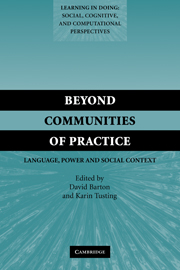Book contents
- Frontmatter
- Contents
- List of Contributors
- Series Foreword
- Introduction
- 1 Literacy, reification and the dynamics of social interaction
- 2 Language and power in communities of practice
- 3 Mediating allegations of racism in a multiethnic London school: what speech communities and communities of practice can tell us about discourse and power
- 4 “I've picked some up from a colleague”: language, sharing and communities of practice in an institutional setting
- 5 The person in the doing: negotiating the experience of self
- 6 Communities of practice and learning communities: do bilingual co-workers learn in community?
- 7 Moving beyond communities of practice in adult basic education
- 8 ‘Communities of practice’ in higher education: useful heuristic or educational model?
- 9 Communities of practice, risk and Sellafield
- 10 Semiotic social spaces and affinity spaces: from The Age of Mythology to today's schools
- Author Index
- Subject Index
- LEARNING IN DOING
- References
2 - Language and power in communities of practice
Published online by Cambridge University Press: 24 November 2009
- Frontmatter
- Contents
- List of Contributors
- Series Foreword
- Introduction
- 1 Literacy, reification and the dynamics of social interaction
- 2 Language and power in communities of practice
- 3 Mediating allegations of racism in a multiethnic London school: what speech communities and communities of practice can tell us about discourse and power
- 4 “I've picked some up from a colleague”: language, sharing and communities of practice in an institutional setting
- 5 The person in the doing: negotiating the experience of self
- 6 Communities of practice and learning communities: do bilingual co-workers learn in community?
- 7 Moving beyond communities of practice in adult basic education
- 8 ‘Communities of practice’ in higher education: useful heuristic or educational model?
- 9 Communities of practice, risk and Sellafield
- 10 Semiotic social spaces and affinity spaces: from The Age of Mythology to today's schools
- Author Index
- Subject Index
- LEARNING IN DOING
- References
Summary
In this chapter, I argue that elements of theories developed within the field of the critical and social study of language could develop the theory of communities of practice, by offering a clearer understanding of the role of language within the process of negotiation of meaning. We have already mentioned in the introduction the need for a more fully developed theory of language within the theory of communities of practice. This chapter explores models from critical social linguistics which elaborate notions left unexplained in Wenger's model and offer theoretical and methodological tools for addressing some significant issues which remain unexplored, demonstrating this by reanalysing some of the example material from Wenger's 1998 book.
PRACTICE AND MEANING
I will begin by exploring the place of language within the theory as it currently stands, particularly the implicit importance of language as a form of meaning making within Wenger's development of the concept of practice. The concept of ‘practice’ is central to his conceptualisation of learning in communities. He defines practice as “doing, but not just doing in and of itself. It is doing in a historical and social context that gives structure and meaning to what we do” (1998:47). This concept of ‘social practice’ offers a way of analysing human activity which brings together the cognitive and the social aspects of human existence.
Information
- Type
- Chapter
- Information
- Beyond Communities of PracticeLanguage Power and Social Context, pp. 36 - 54Publisher: Cambridge University PressPrint publication year: 2005
References
Accessibility standard: Unknown
Why this information is here
This section outlines the accessibility features of this content - including support for screen readers, full keyboard navigation and high-contrast display options. This may not be relevant for you.Accessibility Information
- 29
- Cited by
